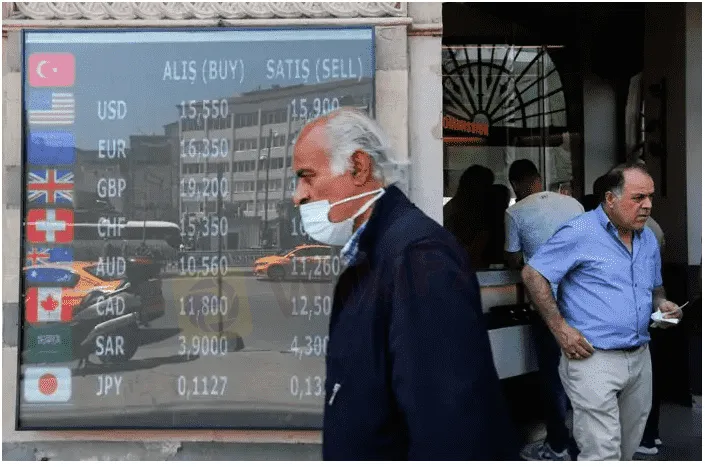简体中文
繁體中文
English
Pусский
日本語
ภาษาไทย
Tiếng Việt
Bahasa Indonesia
Español
हिन्दी
Filippiiniläinen
Français
Deutsch
Português
Türkçe
한국어
العربية
Turkish lira on slow slide in search of FX relief
Abstract: The Turkish lira slipped again on Monday, sustaining a slow slide towards 18 against the dollar as concerns mounted about the government’s foreign exchange policy in the face of surging inflation and fears of global recession.

The slow depreciation could continue unless authorities find a new source of foreign funds to buffer depleted official reserves, analysts say. Adding to uncertainty over coming weeks, corporate depositors will decide whether to largely stick with special state-backed lira-protected accounts.
The lira weakened as much as 0.4% to 17.8335 against the U.S. currency, trading at its weakest levels since a full-blown currency crisis in December, when it hit an all-time low of 18.4.
“We are seeing the lira losing limited value each day with the current policy. The balance in forex can only be achieved with the lira losing value, albeit limited,” said a treasury desk trader at one bank.
The lira has steadily weakened 6.3% this month.
The Turkish Central Bank‘s quarterly inflation report on Thursday and the U.S. Federal Reserve’s expected 75 basis-point interest rate hike on Wednesday were set to be key focuses of attention for investors this week.
On Thursday the Turkish central bank is expected to again raise its end-year inflation forecast from 42.8% previously. According to a Reuters poll, annual inflation is expected to be 70% by end-2022. It hit a 24-year high near 80% last month.
The rampant inflation was triggered by a series of unorthodox interest rate cuts which knocked 44% off the liras value last year. It has weakened another 26% this year.
Despite the unrelenting depreciation, the central bank is expected to keep its policy rate steady at 14% for at least another year, focusing instead on macro-prudential measures on loans and liquidity.
The central banks net forex reserves have tumbled to just over $6 billion this month, the lowest levels since 2002, with bankers calculating forex reserves excluding swaps to be minus $55 billion.
The treasury desk trader said a big question is whether new foreign forex resources will flow into Turkey, given the need for fresh resources is at unprecedented levels.
Authorities sought to stem the liras decline from the end of last year with special bank accounts, dubbed KKM, protecting savers and corporates from large lira falls to discourage hoarding of U.S. dollars, euros or gold.
“Markets are monitoring the rollover of corporates KKMs which begin this week and intensify over 3-5 weeks. We have not yet seen heavy forex demand due to KKM. But the issue of whether KKM rollovers will create forex demand will be important for the course of the lira,” the trader said.

Disclaimer:
The views in this article only represent the author's personal views, and do not constitute investment advice on this platform. This platform does not guarantee the accuracy, completeness and timeliness of the information in the article, and will not be liable for any loss caused by the use of or reliance on the information in the article.
Read more

New Zealand's FMA Warns Against "YouTube Crypto Investment Scam"
The Financial Markets Authority (FMA), New Zealand's financial regulator, warns individuals against investment scams that use YouTube channels to promote fraudulent cryptocurrency investment firms/websites. The authority explained on its official website how the YouTube cryptocurrency scam works, providing a step-by-step guide to help people recognize and avoid it. Read HOW THE SCAM WORKS and BE SAFE.

Trading is an Endless Journey
Every trader dreams of quick success, but rushing the process often leads to mistakes. It’s easy to get swept up in the excitement of winning trades or discouraged by unexpected losses. The truth is, mastering the emotional side of trading can be even more important than understanding market analysis or strategies.

How to Know if the Market is Correcting or Reversing?
In trading, distinguishing between a market correction and a market reversal is crucial for making sound decisions. Misjudging one for the other can lead to missed opportunities or significant losses. While both involve price movements, their causes, duration, and implications differ substantially. Understanding these differences can help traders improve their strategies and adapt to market conditions effectively.

Empowering the Next Generation in Finance with WikiFX: Gen Z’s Investment Journey
With a steadfast commitment to fostering sustainable financial literacy and providing clear, strategic guidance to the next generation, WikiFX has collaborated with Van Lang University and Hoa Sen University to host an exclusive series of financial education workshops. This marks a pioneering initiative by WikiFX in Vietnam, designed not only to deliver foundational knowledge but also to instill a sense of responsibility and cultivate prudent financial decision-making among aspiring young traders.
WikiFX Broker
Latest News
Two Californians Indicted for $22 Million Crypto and NFT Fraud
Macro Markets: Is It Worth Your Investment?
Trading is an Endless Journey
WikiFX Review: Is Ultima Markets Legit?
Colorado Duo Accused of $8M Investment Fraud Scheme
What Impact Does Japan’s Positive Output Gap Have on the Yen?
RM62k Lost Investment Scam After Joining XRP Community Malaysia on Telegram
Victims of Financial Fraud in France Suffer Annual Losses of at Least €500 Million
SEC Warns on Advance Fee Loan Scams in the Philippines
Malaysia Pioneers Zakat Payments with Cryptocurrencies
Currency Calculator


